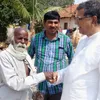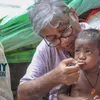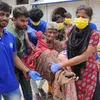This college lecturer from Erode is rehabilitating street dwellers and hopes to have her own care home one day
Manisha Krishnasamy was always inclined towards social work. She started the Jeevitham Foundation to pursue her efforts and help the needy find happiness.
Manisha Krishnasamy always knew she wanted to save and serve people.
A college lecturer in Erode, she actually wanted to serve in the army but social stigma and her family did not allow her to pursue it.
Born to a father who works as a butcher and mother who is a housewife, Manisha never had it easy. At a very young age, she would accompany her father to his mutton stall and saw the hardships the job entailed.
“I realised how difficult it was for my father to manage the family by doing this job, something he had been doing since the age of 14. Moreover, the tasks involved a lot of cutting so that took a toll on his physical health,” Manisha tells SocialStory.
Understanding his difficulties as she grew older, she also began empathising with the street dwellers who were also struggling for a livelihood. So, she wanted to take this purpose to a bigger level.
“I wanted to pursue any course that helped me serve the people. Since the other two options [army and medicine] were out of the question, I pursued BSc Nursing during which I learnt about how nurses should be empathetic and not just sympathetic,” says Manisha.

Social service has always been in Manisha's blood
She started providing street dwellers nearby with meals for one time. However, she realised that wasn’t solving the problem.
“They still had no roof over their heads to protect them from the heat or the rains,” she notes.
She also saw that the care homes were not ready to take in these people, and government hospitals also did not provide them with sufficient care. Unidentified patients were never given any food or attention to their illnesses.
Realising that working with NGOs could help her contribute more, she became a part of several NGOs that conducted plantation drives, recovery services, rehabilitation, etc.
But when she decided to stick to one NGO, it became difficult; things started getting a little competitive and she was often oppressed for being a woman.
“I wanted to serve people, and didn’t see the need to be a part of any NGO that didn’t value my efforts. However, there was no question that it was a great platform to help the needy. So, I planned to start my own foundation,” she shares.
Jeevitham Foundation
Manisha’s first step was to find a team that would be aligned to her ideas of serving the needy.
“Once I realised that this foundation can work, I registered our efforts under the Jeevitham Foundation in 2018,” says Manisha.
The primary goal of Jeevitham is to rehabilitate abandoned street dwellers – be it an elderly person or a mentally unwell patient, and even a drug addict. The first step is to sit with them and understand their exact needs. Basics like food, clothes, and more are provided to build a rapport with them, and their entire history is noted.

Manisha's primary goal is to ensure that the needy people feel fresh and better about themselves
Manisha explains, “For those who have families, we try to reach out to them. But for those who do not have any relatives, we send them to care homes. If they are able to work, we try to help them find a job and fend for themselves.”
Most of these jobs include employment as a security guard, sweeper, construction site worker, and more. They are also provided with accommodation.
Rehabilitation and recovery of the poor
As care homes are often uncomfortable in housing street dwellers in their establishment, volunteers at Jeevitham help in cleaning and grooming these people.
“Once we identify someone who needs help, we first head to the local police station where we get a NOC to help the person recover. Then we groom, bathe, and feed them and help them feel refreshed. In fact, their attitude completely changes once they recover,” says Manisha.

One of the rehabilitated people
So far, the foundation has rehabilitated more than 260 people in and around Erode, and nearby places like Tirupur, Salem, and more. Jeevitham has tied up with about seven homes in and around Erode.
The basic care needed for each person amounts up to Rs 10,000, which includes food, clothes, grooming essentials, travels costs, and other needs for one month at the home.
While the foundation was being sustained on donations from social media, Manisha’s cause was recently listed by the crowdfunding platform Milaap, and has raised about Rs 90,000 from the platform.
Impact of COVID-19
During the lockdown, Manisha took permission from government offices, and distributed masks, soaps, handwash, rations, and three meals a day to the people on the roadside.
Soon, even NGOs started distributing food in the area along with Manisha. However, by the end of March, she realised something that there were too many people on roads.
“Every time I parked the scooter, a whole lot of people crowded around me. I knew this wasn’t right as the virus was spreading like wildfire. So, while everyone was forced to lock themselves in their home, why did these people have to stay outside on the roads?”

A glimpse of the work during the lockdown
Jeevitham realised these groups were a mix of stranded migrant workers and other needy individuals. She requested the commissioner to help them arrange a school facility for these people. Soon, the demand was met and the crowd of 84 people was moved to a nearby school, which had shut down due to the lockdown.
“We created a community kitchen in the school and asked these people to cook while we provided the rations, clothes, and other essentials to everybody,” recalls Manisha
In addition to this, they also provided herbal tea, conducted physical exercise and other entertainment sessions. After two months, they managed to help 54 of them with different blue-collar jobs, while the others received tickets to go back to their hometown.
Making ends meet
“Being a woman working with other people is often looked down upon in my community. Moreover, I lack the support of my family,” Manisha says.
Even though she is appreciated by some of her old friends and even some strangers, none of them are ready to help her in these efforts.
She plans to set up a home by herself one day within the city itself since she wants to bring down the costs, as well help them get small jobs like making areca plates and tumblers by providing suitable machinery for this.
“After 4 pm, the workforce will stop their labour and tend to the elderly and those facing mental issues. They will also be able to enjoy activities and other sessions within the home. I hope to reach this dream within the next two years,” says Manisha.
While she hopes to raise enough funding to achieve this, her personal finances won’t be enough.
“Even though I don’t have a lot of money, I am very happy this way. I know I have to run in order to make ends meet, but my foundation gives me the strength and happiness that I need to sustain,” she shares.
Edited by Saheli Sen Gupta











